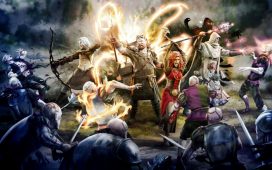It has not, I’m sure we can all agree, been a standout year for video games. Although the ongoing pandemic certainly encouraged more people to play, especially online, the release schedule has been … patchy. The fact that two standout titles of 2021 so far are cartoon platformer sequels to games from the 00s – Psychonauts 2 and Ratchet & Clank: Rift Apart – tells us a lot about how weird this year has been. Hitman 3, Resident Evil Village and It Takes Two were all solid (and my editor would tell you that Returnal is unmissable), but the schedule has relied heavily on updated editions and remakes – take a bow Super Mario 3D World, Mass Effect Legendary Edition and Ghost of Tsushima Director’s Cut.
We know why this has happened. Covid ramped up the difficulty level of building games to Impossible Mode, with teams working at home, having to download millions of GBs of data, dealing with remote access to dodgy builds and holding intricate design meetings over Zoom from the kitchen table while homeschooling their kids. The result has been endless delays, including Horizon Forbidden West, Ghostwire: Tokyo and Gran Turismo 7 (though that last one is not really a shock, to be honest).

With the autumn release schedule approaching, however, surely we’re all saved? Surely embattled game publishers will bring out the big guns? Well … it’s complicated. There are certainly some traditional blockbusters on the way. Shooters Far Cry 6 and Battlefield 2042 are imminent, Forza Horizon 5 is the big driving game of the year, and then there’s Metroid Dread, a science-fiction throwback that will delight longtime Nintendo fans. The Guardians of the Galaxy game from Square Enix will hopefully at least be better than The Avengers. Personally, I can’t wait for J-horror sequel Fatal Frame: Maiden of Black Water, but I can’t see people queueing down the street at midnight to buy that on day one.
Compared with a normal year, though, this is sparse. In a release period usually dominated by annual sequels, there will be room for newcomers such as Arkane’s time-twisting assassin adventure Deathloop, rite-of-passage adventure Sable, Yakuza spinoff Lost Judgment and co-op horror shooter Back 4 Blood. On the indie side, we will get cute feline adventure Mineko’s Night Market and the beautiful tidying game Unpacking. People who might have never played such games in a busy year may have time to chance on something unusual in 2021.

But there remains a sense of anticlimax, symbolised by the ghostly spectres that were the digital E3 and Gamescom events. In their physical formats, both of those shows are gross, offensively expensive and horribly overcrowded – but they also generate excitement, discussion and, let’s face it, very entertaining memes of terrible stage presentations, Keanu Reeves worshipping, and people inexplicably queueing for three hours to play Call of Duty. Neither E3 nor Gamescom really worked as online events. It’s difficult to get excited about a series of trailers.
Games got a lot of us through 2020. They offered a safe way to socialise and an escape from a novel and scary situation. But given how 2021 has gone, with its disappointments and ongoing periods of isolation and constant sense of mortal dread, perhaps video games were never going to be able to save us this time. The fact is that being into video games isn’t just about playing; it’s about the culture. It’s meeting friends at Rezzed or EGX or Insomnia, or cosplaying at MCM, or throwing an E3 press conference party and taking a swig every time someone on stage says “awesome”. Without these many moments of interpersonal hype-building, without the global drumroll of fervid anticipation, maybe even Half-Life 3 would have struggled to excite people this winter.














